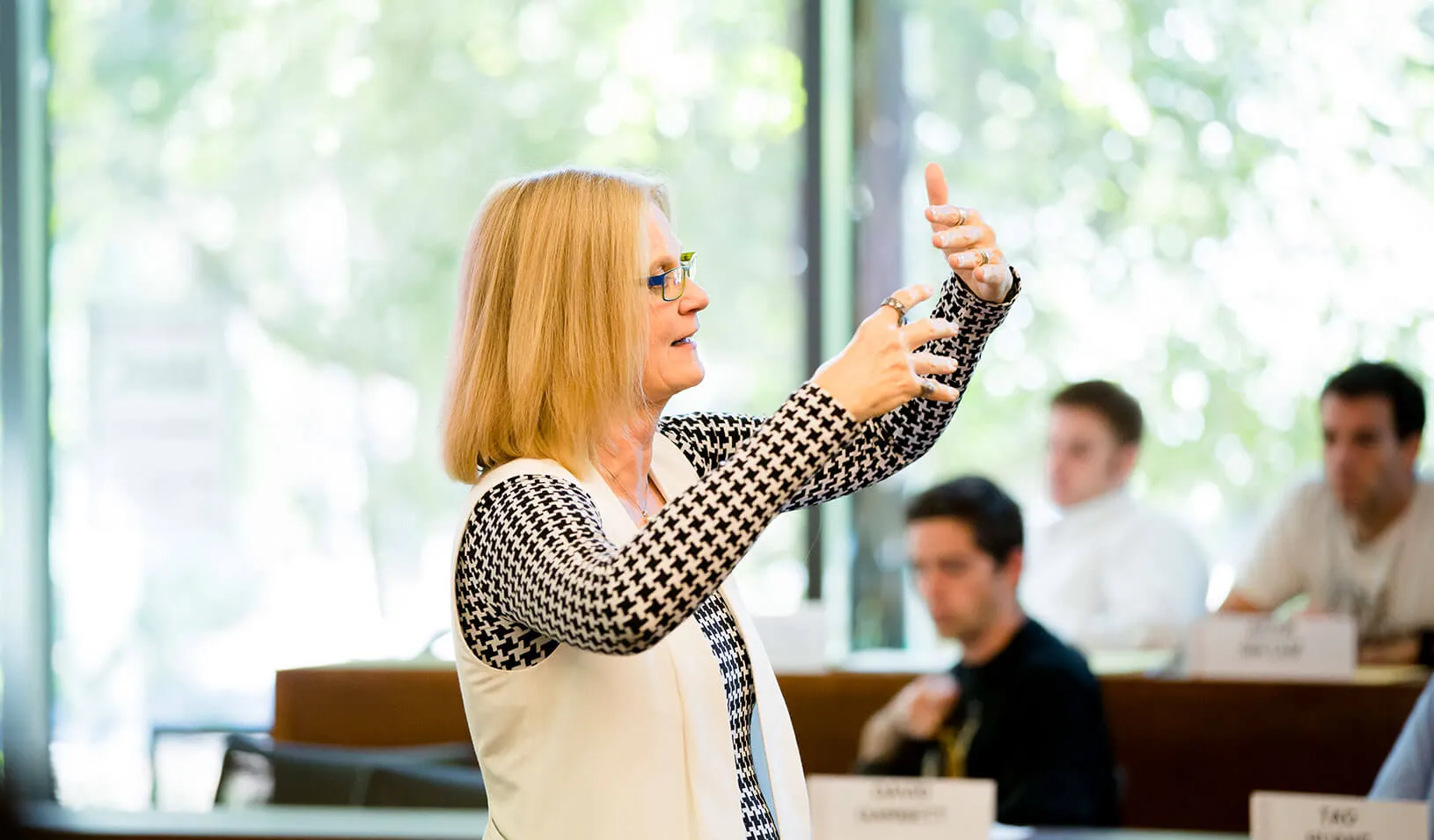March 06, 2020
Margaret Ann Neale, the Adams Distinguished Professor of Management, Emerita, retired after 25 years of service at Stanford Graduate School of Business.
“Margaret has proven to be a great leader, mentor, and scholar throughout her tenure at the GSB. She helped steward and position the school’s academic programs for success well into the future, while also mentoring junior faculty and students and establishing herself as a groundbreaking expert in her field of study,” said Jonathan Levin, the Philip H. Knight Professor and Dean of Stanford GSB. “Margaret’s contributions have enriched the academic experience for the entire Stanford GSB community.”
Neale served as a senior associate dean for academic affairs from 1997 to 2000, and her leadership helped bring about significant change to the school’s curriculum. Neale built Stanford GSB’s Behavioral Lab, which attracted more behavioral scientists to the school and boosted the research productivity of junior faculty and doctoral students. She also developed and taught Stanford GSB’s course on negotiations, and introduced the Managing Groups and Teams course to the school’s curriculum. The latter eventually became a required course — and immensely popular — with first-year MBA students and new faculty.
A prolific contributor to Executive Education at Stanford GSB, Neale most recently was the co-director of the Executive Program in Women’s Leadership, director of the Influence and Negotiation Strategies Program, and director of Managing Teams for Innovation and Success. She was also on the faculty of many other Executive Education programs at the school, and frequently conducted seminars and management development programs in the United States and abroad.
Neale joined the Stanford GSB faculty in 1995 as a professor of organizational behavior after earlier working at the University of Arizona and Northwestern University. She served as the John G. McCoy-Banc One Corporation Professor of Organizations and Dispute Resolution from 2000 to 2012, and as a Stanford GSB Trust faculty fellow in 2000-2001 and in 2011-2012.
Neale’s career at Stanford GSB is highlighted by a number of “firsts” on the gender front. She was the first woman to be hired at the tenured professor level at Stanford GSB; the first woman to direct an Executive Education program; the first woman to serve as associate dean at the school; the first woman to win the Davis Award recognizing academic distinction and service to the school; the first woman to win the Executive and Non-degree Teaching Award; the first woman to receive one of the three Adams Distinguished Professor Chairs; the first woman to serve as the chair of a major committee (GSB MBA curriculum revision, 1997); and the first woman to receive the Silver Apple Award, now known as the Robert K. Jaedicke Faculty Award, for service to the school’s alumni.
During her tenure at Stanford GSB, Neale was also admired by colleagues for her mentorship. Jennifer Aaker, the General Atlantic Professor of Marketing, described Neale as a remarkable mentor of junior faculty.
“What is fascinating is that she acts in ways that are aligned with her research findings,” said Aaker. “For instance, studies show that missing an opportunity to negotiate can significantly reduce your opportunities down the road. However, if you reframe how you think about negotiation as problem-solving, particularly in the context of important goals in your life, you can better advocate for yourself and ultimately make meaningful progress toward your goals. What is also fascinating is that Maggie not only mentors you in a way that allows you to achieve your potential, she makes it easy for you to help others do the same — her ripple effects are significant.”
Neale’s impact extended beyond the Stanford GSB community. She greatly influenced the fields of negotiations, team performance, and decision making through her research. She helped introduce prior cognitive psychological work on decision biases to the field of negotiations, which revolutionized that area of study. She also explored how team composition and group processes factored into learning and problem-solving in both face-to-face and virtual team environments.
Neale published more than 70 research articles, and she co-authored six books:
- Getting (More of) What You Want (2015)
- Looking Back, Moving Forward: A Review of Group and Team-Based Research (2012)
- Research on Managing Groups and Teams: Negotiating in Teams (2011)
- Power and Influence in Organizations (1998)
- Negotiating Rationally (1994)
- Cognition and Rationality in Negotiation (1991)
Her research has influenced a broad audience, including academics, men and women in business, and industry experts. Forbes magazine featured Neale in a story on negotiation advice for women; KQED Radio spoke to her about “getting what you want” in the workplace and at home; Harvard Business Review talked to her about how to bounce back from a failed negotiation; and the New York Times interviewed her on how women should ask for a raise. Neale’s research also shows that diversity makes groups smarter. Scientific American profiled her findings in a 2006 experiment; the groups with racial diversity significantly outperformed the groups with no racial diversity when they had to perform a murder mystery exercise.
Neale’s leadership at Stanford GSB has made a positive impact on her colleagues, students, and academic peers, and she continues to have a large presence at the school through her research, mentorship, and involvement with Executive Education programs.
For media inquiries, visit the Newsroom.



